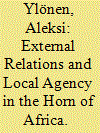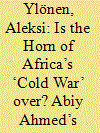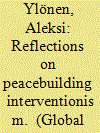| Srl | Item |
| 1 |
ID:
190360


|
|
|
|
|
| Summary/Abstract |
Strategic and security analysis of the Horn of Africa systematically portrays the roots of instability as external. However, the region’s stability or instability is largely determined by local actors and conditions. Local agency and context largely set the conditions for the involvement of external actors. This article discusses how state and nonstate actors have conducted their engagement with outside powers, especially the Gulf states, at a time of increasing rivalry for influence in the Horn of Africa, with examples ranging from Ethiopia to Somalia, and from Djibouti to Somaliland.
|
|
|
|
|
|
|
|
|
|
|
|
|
|
|
|
| 2 |
ID:
157833


|
|
|
|
|
| Summary/Abstract |
We use a unique data-set gathered during a short-lived interwar period in the Nuba Mountains of Sudan to compare characteristics of the households returning after the conflict with those that stayed in their communities of origin. We found that returning households seemed to face worse economic conditions, particularly in the case of female-headed returnee households. Nevertheless, our results show that returnees tend to perform better on different health indicators. Using a detailed set of variables about hygiene and sanitary habits, we explore the hypothesis that the latter result may be related to changes in attitudes given the distinct experiences during displacement. We show that returnees are indeed more likely to adopt these measures.
|
|
|
|
|
|
|
|
|
|
|
|
|
|
|
|
| 3 |
ID:
165764


|
|
|
|
|
| Summary/Abstract |
On 9 July 2018, Ethiopia and Eritrea signed a historical agreement pledging to end their mutual animosity and work for peace. The unprecedented rapprochement was facilitated by the new leadership in Ethiopia, merging interests between the two states and external mediation. This commentary looks into Ethiopian Prime Minister Abiy Ahmed Ali’s early reform initiatives and the dynamics of the rapprochement between Ethiopia and Eritrea.
|
|
|
|
|
|
|
|
|
|
|
|
|
|
|
|
| 4 |
ID:
144299


|
|
|
|
|
| Summary/Abstract |
In 2005 Southern Sudan emerged from a long period of protracted civil war. The Comprehensive Peace Agreement marked the beginning of a period of post-war peacebuilding concentrating on statebuilding. However, since 2005, the much-needed gradual process of building a unified nation and inclusive national identity has been largely neglected. Instead, there has been emphasis on achieving ‘peace-through-statebuilding’ that has contributed to a highly exclusive social, economic, and political order dictated by the leadership of the dominant rebel movement turned government, the Sudan People's Liberation Movement/Army (SPLM/A). This essay reflects on peacebuilding interventionism, and state- and nationbuilding in Southern Sudan since 2005. It argues that this overall process dictated by the SPLM/A leadership, focusing on security and state, excluded the majority of Southern Sudanese from the peace dividend and economic and political opportunities. Further, the exclusive top-down SPLM/A-centric view of the nation marginalized part of the population and contributed to the continuing political instability and armed violence orchestrated by the leading individuals and other military men.
|
|
|
|
|
|
|
|
|
|
|
|
|
|
|
|